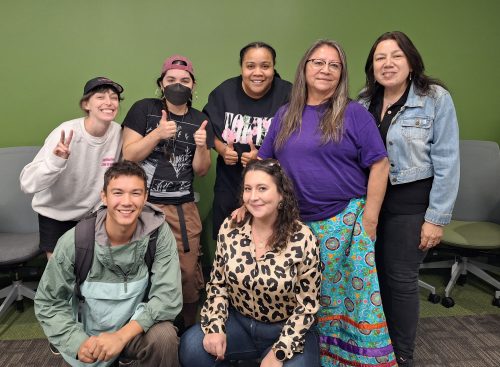
The Indigenous Climate Action Grant is a program created to support the implementation of the City’s Transform TO NetZero Strategy (2021.IE26.16), which set an ambitious target to reduce community-wide emissions in Toronto to net zero by 2040. As part of the Strategy, the City is committed to working with Indigenous rights holders and urban Indigenous communities to share knowledge and learnings.
In 2022, The City of Toronto launched the Reconciliation Action Plan that acknowledges and affirms that the city resides on lands and waters that have been occupied and stewarded by Indigenous Peoples since time immemorial. Indigenous climate action is led by Indigenous Knowledge Holders, water protectors, land defenders, and food security advocates from across Turtle Island. The Indigenous Climate Action Grant program encourages the Indigenous community to determine what climate action is needed and to take meaningful action to reduce emissions and realize the co-benefits of a healthy, thriving, and equitable city.
| Funding Stream 1: Up to $10,000 per project | Funding Stream 2: Up to $20,000 per project |
|---|---|
|
|
Indigenous individuals, Indigenous-led grassroots groups with community projects and non-profit organizations are encouraged to apply. Non-Indigenous non-profits are eligible, but must have an Indigenous project lead, an Indigenous council to guide the project and the project must serve the Indigenous community.
Examples of possible projects include:
Rolling submissions open: May 13, 2024
Information Session: May 22, 2024
First Application Deadline: June 24, 2024
Second Application Deadline: September 20, 2024
Projects Begin: Summer 2024 or later
Project Completion, Report Submission and Evaluation: By November 2025
Please contact us for support in developing your idea, networking with community members, or book a visioning session to help turn your climate action dream into a reality. If you have received City of Toronto funding previously, please reach out to us before filling out your application. All questions are welcome! Please contact Miranda.Black@toronto.ca.
Notice of Collection
The City of Toronto (Environment and Climate Division) collects personal information in this application under the legal authority of the City of Toronto Act, 2006, section 83 and Item IE26.16, City Council Decision 1, as confirmed by the City of Toronto By-law 1110-2021.
The City will utilize this information for the purposes of administering the Indigenous Climate Action Grants program, including: the consideration and evaluation of applications; communication with grant applications, selection of grant recipients, processing and entering into grant agreements with successful applicants as required, as well as monitoring and ensuring on-going compliance of grant recipients with the terms and eligibility of the Indigenous Climate Action Grants program.
For any questions regarding this collection, please contact: Project Lead – Indigenous, Outreach and Engagement, Environment and Climate Division, USEW-2 C/O Metro Hall, 2nd Floor, 55 John Street, Toronto, Ontario M5V 3C6 437-221-7343

We would like to thank our 2023 Review Committee. Miigwetch and Nya:wen,
Elder, Vivian Recollet, Turtle Clan from Wikwemikong unceded territory;
Maria Simonelli, Brunswick House FN, Oji-Cree and Italian descent, Community Leader;
Crystal Sinclair, Nehiyaw, Member of Fisher River Cree Nation, Community Leader;
Shar-Dey Phillips-Walker, Lac Seul First Nation, Community Leader;
Zephyr McKenna, Munsee Delaware First Nation and Alderville First Nation, Indigenous Youth;
Samuel Wong, Metis with family roots in Calahoo, St. Albert and Lac St. Anne AB, Indigenous Youth; and
Lyla Hatt, Peskotomuhkati Nation at Skutik and Mixed Ancestry, Indigenous Youth.
For 2024, our review committee is devised of members of the Indigenous Community who have been selected to review grants for the Indigenous Climate Action Grants based on the following considerations:
A trustee is an incorporated not-for-profit organization with audited financial statements and the financial systems in place to administer grant funds.
A trustee will distribute the funding according to the approved project budget. Trustees may also provide additional support to funded projects, such as project management and mentorship. Non-profit applicants in Stream 2 can act as their own trustee, provided they fulfill all the requirements listed below.
Trustee organizations must meet all of the following eligibility criteria and be approved by City staff to act as your trustee:
The trustee organization:
Trustee organizations may charge fees for their services. Fees of up to 15 per cent of the total project funding are eligible for funding